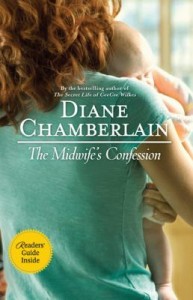 Thus far 2010 has been a difficult year for Tara Vincent and Emerson Stiles. First, Tara’s husband, Sam, dies in a car accident; then their best friend, a local midwife named Noelle Downie, inexplicably commits suicide. Sam, Noelle, Tara, and Emerson have been best friends since attending UNC Wilmington together in the 1970s, so the double loss is especially hard. The Noelle who Tara and Emerson knew was an ethical, passionate human being devoted to her work; she had no secrets, especially from them. But it appears they didn’t know the real Noelle, something that becomes uncomfortably evident as her private papers reveal more and more about her life, her family, and a horrifying mistake that may have led to her mental destruction.
Thus far 2010 has been a difficult year for Tara Vincent and Emerson Stiles. First, Tara’s husband, Sam, dies in a car accident; then their best friend, a local midwife named Noelle Downie, inexplicably commits suicide. Sam, Noelle, Tara, and Emerson have been best friends since attending UNC Wilmington together in the 1970s, so the double loss is especially hard. The Noelle who Tara and Emerson knew was an ethical, passionate human being devoted to her work; she had no secrets, especially from them. But it appears they didn’t know the real Noelle, something that becomes uncomfortably evident as her private papers reveal more and more about her life, her family, and a horrifying mistake that may have led to her mental destruction.
The shocking revelations pile up, but what hurts Tara even more is the gaping distance growing between her and her daughter, sixteen-year-old Grace. Quiet, dark Grace was especially close to her father, as different from the blonde and outgoing Tara as night is from day. Tara loves her daughter desperately, but she feels helpless to repair their foundering relationship. She envies Emerson’s easy, close bond with her daughter (and Grace’s best friend), Jenny. But Noelle’s secrets will spiral wide to include both mothers and daughters, and nothing will ever be the same again.
Diane Chamberlain presents a heartfelt, intriguing novel about familial relationships: both those we construct through friendships, and those we are born into. No matter how close we are, we never truly know those we love as well as we might think. Written from multiple first-person viewpoints, Chamberlain tells the tales of Noelle, Grace, Tara, and Emerson across fifty years, flowing effortlessly between the past and present. This is an excellent beach read, book club novel, or for any time.
Check this title’s availability in the UNC-Chapel Hill Library catalog.


